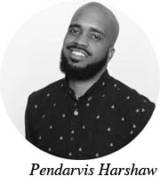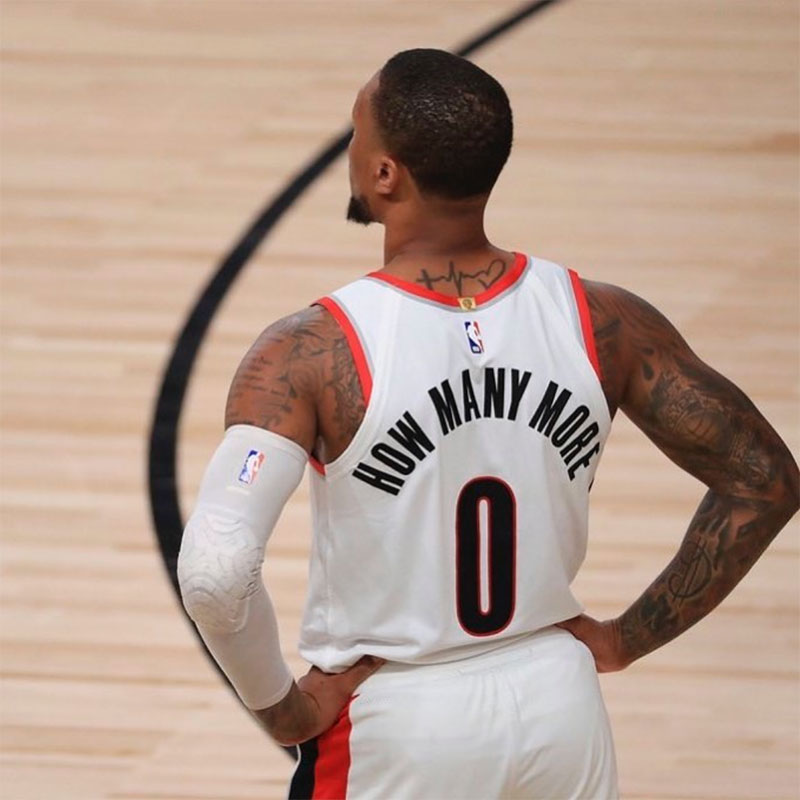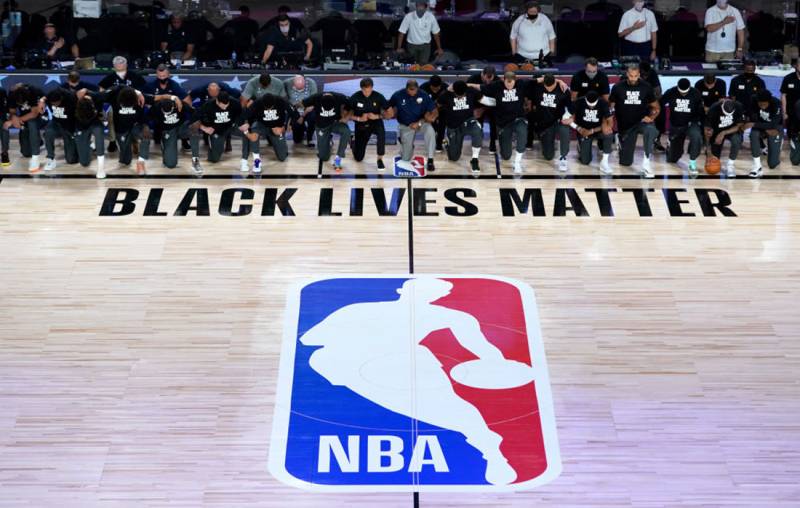After a hiatus these past few months, pro sports are back. And somehow, in the meantime, I’ve converted from a common fan to a social scientist, paying extremely close attention and constantly analyzing how they play a part in the oddity that is the year 2020. Thus far, from what I’ve seen, the WNBA and NBA are maintaining health and safety, as well as keeping a focus on social justice—in fact, they’re doing it better than any of the “Big Four” sports leagues.

They’ve got strict health guidelines and now-famous bubbles to contain the basketball players for the season. The room for social commentary, while limiting (after all, both leagues are businesses), seems to be more flexible than other leagues.
There’s entertaining competition. The actual games, aesthetically, are eye-catching. Even with a digital display of fans replacing the normal crowd, it’s not too bad.
And it’s also not pure escapism. The masks on the faces of everyone sitting on the sidelines is a reminder that we’re living in a pandemic where over 700,000 people around the world (and over one-hundred and sixty thousand people in the United States) have died from the virus.
But, man, after a long day of work, reading and writing about bad news on top of bad news, confined to my house with no one to talk to, there’s nothing like yelling at my screen while Oakland-raised NBA superstar Damian Lillard goes for 51 points.

Lillard, who wears the number 0, sports a jersey this season bearing the words “How Many More” across the top. It’s a rhetorical question, posed to the general public, about the number of Black people killed by the police; obviously, the ideal answer is zero. Lillard evidently wanted to have “Oscar Grant” on his uniform. But he, like all other NBA players, had to choose from a pre-selected list of about 30 social justice terms the NBA decided to allow.
That means Lakers guard Alex Caruso—who, aside from the fact he’s 6’5″, is a relatively “normal looking” balding American white dude—now goes to work every day with the words “Black Lives Matter” on the back of his uniform.
At press time, Caruso, along with LeBron James and Anthony Davis, have given the Lakers the best record in the Western Conference in this abbreviated NBA season, which is actually a continuation of the suspended season from earlier this year. That means that, although play resumed just about two weeks ago, the “season” will conclude at the end of this week. And then the playoffs start.
Meanwhile, the WNBA is heading into their fourth week of play; their abbreviated season began in late July and is set to run until mid-September. (Normally the season goes from late May until early October.) Their bubble is located in Bradenton, Florida, at the sports magnet school IMG Academy.
One of the bubbles within that bubble is the attention given to Bay Area-born point guard Sabrina Ionescu. A star rookie from the University of Oregon, Ionescu was drafted number one overall last year by the New York Liberty. Ionescu and her squad opened the season against Sue Bird and the Seattle Storm, and before the National Anthem played, both teams walked off the floor.
This came on the heels of the league developing the Justice Movement platform and the WNBA/WNBPA Social Justice Council. According to their press release, “The mission of the Social Justice Council is to be a driving force of necessary and continuing conversations about race, voting rights, LGBTQ+ advocacy, and gun control amongst other important societal issues.”
In addition to teams wearing warm-ups that say “Black Lives Matter” across the front and “Say Her Name” on the back, the Social Justice Council has backed this year’s WNBA’s customized jerseys, which bear Breonna Taylor’s name across the back. The idea, reportedly brought forward by Las Vegas Aces star player Angel McCoughtry, has met some opposition—namely from Senator Kelly Loeffler. A Republican from Georgia and co-owner of the WNBA team the Atlanta Dream, Senator Loeffler has been critical of the Black Lives Matter movement in the past, and just last week published a statement against BLM’s “radical ideas and Marxist foundations, which include defunding the police and eroding the nuclear family.”
Loeffler’s statement came in response to WNBA players on both the Atlanta Dream and the Phoenix Mercury wearing shirts that read “Vote Warnock,” in support of Dr. Raphael G. Warnock, the Democrat currently campaigning for Senator Loeffler’s seat.


